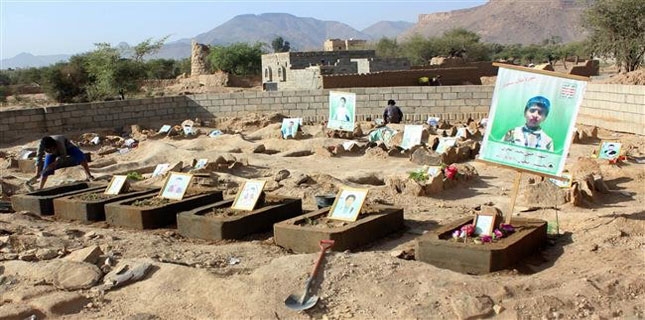 |
UN CHILD RIGHTS BODY URGES SAUDI ARABIA TO HALT STRIKES AGAINST CIVILIANS IN YEMEN |
Friday, 12 October 2018 |
source:
shiitenews |
 |
|
The United Nations Committee on the Rights of the Child has strongly urged Saudi Arabia to stop its ceaseless deadly airstrikes against civilian targets in impoverished Yemen. The panel of 18 independent experts made the demands in a statement on Thursday, adding that Yemeni children were being killed, maimed and orphaned by the Saudi-led military coalition that has been pounding Yemen for the past three and a half years. Last week, Saudi Arabia told the panel that it was working hard to correct what it described as mistaken targeting by the military alliance, but the experts have already voiced skepticism. The panel voiced concern about “the inefficiency of the Joint Incidents Assessment Team (JIAT) set up by the coalition in 2016 to investigate allegations of unlawful attacks by (Saudi Arabia) and members of the coalition on children and facilities and spaces frequented by children.” According to UN figures, at least 1,248 children have been killed and nearly the same number sustained wounds in airstrikes since the onset of the imposed war in March 2015. One of the worst and most tragic cases of targeting Yemeni children occurred on August 9, when Saudi-led warplanes hit a school bus as it drove through a market in the town of Dhahyan in the northern province of Sa’ada. The death toll included 40 children out of 51 people, while 56 of the 79 wounded were also kids. The children were returning from a trip organized by a religious seminary when the bus came under attack. Images later circulated online, showing pieces of a US-made bomb on the scene. The horrific incident sparked outrage from international human rights groups and UN officials. The panel also noted that the Saudi-led war machine had conducted attacks on civilian targets in Yemen, including homes, medical facilities, schools, farms, weddings and markets, in breach of international law. It also called on the Saudi-led coalition to remove its tight aerial and naval blockade on the impoverished country, saying the siege has deprived millions of Yemenis of food and other desperately-needed supplies, which were used to be imported through the vital port of Hudaydah. In October last year, the UN blacklisted Saudi Arabia and its allies for the killing and maiming of Yemeni children. The world body said at the time that the Saudi-led coalition was responsible for 683 child casualties and 38 verified attacks on schools and hospitals in 2016 alone. In June 2016, the UN blacklisted the Arab kingdom after concluding in a report that Riyadh was responsible for 60 percent of the 785 deaths of children in the Saudi war on Yemen in the previous year. A few days later, however, the world body, then led by Ban Ki-moon, announced that Saudi Arabia would be taken off the list pending a joint review with the kingdom. At the time, Ban acknowledged that he was forced to remove Riyadh from the blacklist after the regime and its allies threatened to cut off funding to many UN programs. The move triggered an outcry from human rights groups around the globe. In December that year, the US canceled the sale of precision-guided munitions to Saudi Arabia because of concerns about civilian casualties. In March 2017, however, the administration of President Donald Trump overturned the ban. Saudi Arabia and some of its allies, including the United Arab Emirates, Morocco, and Sudan, launched the brutal war against Yemen in an attempt to reinstall Yemen’s former president Abd Rabbuh Mansur Hadi and crush the country’s popular Houthi Ansarullah movement, which has played a significant role, alongside the Yemeni army, in defending the nation. The aggression initially consisted of a bombing campaign but was later coupled with a naval blockade and the deployment of ground forces to Yemen. Some 15,000 Yemenis have so far been killed and thousands more injured. More than 2,200 others have also died of cholera, and the crisis has triggered what the United Nations has described as the world’s worst humanitarian disaster. The imposed war has also taken a heavy toll on the country’s infrastructure, destroying hospitals, schools, and factories. The UN has said that a record 22.2 million Yemenis are in dire need of food, including 8.4 million threatened by severe hunger. Some Western countries, the United States and Britain in particular, are also accused of being complicit in the ongoing aggression as they supply the Riyadh regime with advanced weapons and military equipment as well as logistical and intelligence assistance. |
Share: |
|